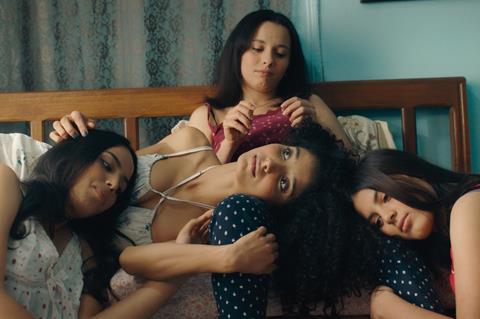Kaouther Ben Hania enters Cannes Competition with a hybrid documentary portrait of a Tunisian mother and her daughters

Dir/scr: Kaouther Ben Hania. France, Tunisia, Germany, Saudi Arabia. 2023. 107mins
“I hate girls. I never wanted daughters,” says Olfa. And yet, she had four of them. Only two, Eya and Tayssir, remain in their home in Tunisia. The circumstances that lead to the disappearance of the two older girls, Rahma and Ghofrane, are explored in this potent, probing and occasionally manipulative hybrid documentary which casts actresses in the role of the missing women. It’s frequently an uncomfortable watch and, at points, prompts prickly ethical questions about the potential for the re-traumatisation of documentary subjects. But, perhaps more unexpectedly, this bold and confrontational film is also joyous, playful and in some ways even empowering.
Potent, probing and occasionally manipulative hybrid documentary
It marks a return to documentary for Kaouther Ben Hania, whose debut non-fiction feature, The Challat of Tunis, opened Cannes ACID in 2014. Her second documentary, Zaineb Hates The Snow, premiered in Locarno. After her fiction debut, Beauty And The Dogs, screened in Un Certain Regard in 2017; she went on to direct the Oscar-nominated art world satire The Man Who Sold His Skin. Ben Hania has cited Dogville as an influence on her latest project, but Four Daughters stands on its own as a distinctive, daring and original work that should spark debate on the festival circuit and will likely prove to be of interest for arthouse distributors. Jour2Fête will release the film theatrically in France in the summer.
Olfa may “hate girls”, as she says during one of many heated moments, but she has even less time or respect for men. Yet she unwittingly speaks for them, fully embodying the patriarchal pressures the Tunisian society imposes on girls and women – particularly those like Olfa’s daughters, who have the misfortune to be strikingly beautiful. Olfa’s fear of men’s interest in her daughters twists itself into an assumption of moral failure on the part of the girls, manifesting in savage verbal assaults and physical attacks. Eya and Tayssir reminisce about brutal beatings meted out by their mother; Olfa herself admits to breaking a broom handle during a prolonged assault on Ghofrane – punishment that only ended when Olfa thought her daughter was dead.
To recreate moments and memories with the participation of Olfa and her remaining daughters, Ben Hania employs actresses to play the roles of Rahma (Nour Karoui) and Ghofrane (Ichraq Matar). In addition, she recruited the Egyptian-Tunisian star Hend Sabri to play Olfa and interrogate her about her actions and motivations. While the film doesn’t fully condemn Olfa, it does hold her to account: “You are selfish, Olfa,” says Sabri, during a process of improvisation and unpacking that feels a lot like group therapy.
Like therapy, the film takes its participants to some painful places – and the camera is at times perhaps a little over-eager to hone in on tears glistening in the eyes of these women. At other moments, it’s the actors who struggle. Majd Mastoura, who plays all the male characters, calls a halt to the filming of one harrowing scene in which Eya confronts the abuse she and her sisters experienced at the hands of her mother’s boyfriend. What follows is important: Eya insists that the scene is essential and that she has already acted it out many times before during previous counselling sessions. Ben Hania doesn’t stake a claim in the family’s story – she allows Olfa and her girls to have considerable input in deciding the direction that the film takes.
The agency and control that the subjects are given is key. After all, it was control over an aspect of their lives that led to the loss of the two older girls. Given the option of being labelled as whores or embracing religion, they opted for the latter. And gradually, they became radicalised to the extent that both left to join Islamic State in Libya. They remain in Libya, in prison alongside Ghofrane’s young daughter. Meanwhile, Olfa and her remaining daughters campaign for their repatriation and try to figure out how to break the family’s cycle of suffering – a ’curse’ that is passed on from mother to daughter in each new generation.
Production company: Tanit Films
International sales: The Party Sales samuel.blanc@thepartysales.com
Producer: Nadim Cheikhrouha
Cinematography: Farouk Laaridh
Editing: Jean-Christophe Hym, Qutaiba Barhamji, Kaouther Ben Hania
Production design: Bessem Marzouk
Music: Amine Bouhafa
Features: Hend Sabri, Olfa Hamrouni, Eya Chikhaoui, Tayssir Chikhaoui, Nour Karoui, Ichraq Matar, Majd Mastoura
























